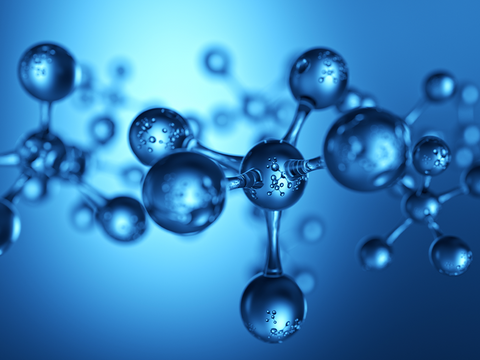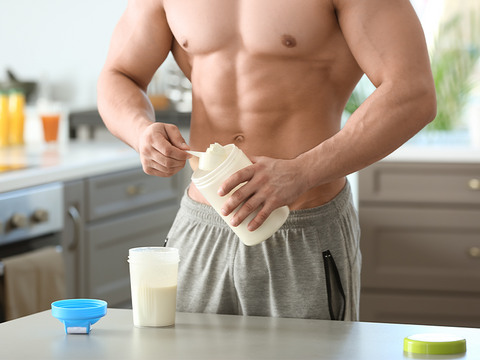Grab your cheat sheet. |
If you're a man over thirty and feel like you're experiencing a dip in performance and energy, there may be a reason for it - it could be due to decreasing testosterone levels.
When men reach their 30s, it’s common for testosterone to drop. As testosterone is responsible for several typically masculine traits, a reduction in levels can bring about a load of different side effects and symptoms, including weight gain, lack of energy and lower sex drive.
As a result, it’s recommended for men to test t-levls regularly in order to dig into the root of the problem and see if it’s an underlying problem.
When you measure testosterone, you’ll typically see both free and total testosterone. That’s because testosterone is more complicated than the total amount - with various types responsible for different duties and functions.
But what is the difference between free and total testosterone?
This post will cover free testosterone and how it can affect overall well-being, detailing why knowing about this type of testosterone can be life-changing:
What is free testosterone?
Free testosterone is the form of testosterone circulating unbound in a man's bloodstream, ready to be utilized in any number of roles that testosterone plays throughout the body.
Free testosterone is key for men looking to capitalize on its wide-ranging health benefits, from producing lean muscle and burning fat to improving libido and deepening vocal range.
This natural hormone can also help lower cholesterol, protect against heart disease, sharpen mental clarity and a lot more.
As free testosterone is a type of testosterone that is not bound to protein, it's more effective as it can instantly be absorbed and used by muscle tissue. It is an essential part of a man's overall well-being that shouldn't be overlooked.
What is total testosterone? (and is it the same as bound testosterone)
Total testosterone is essential for both men and women of all ages.
It is a combination of the primary male hormone, testosterone, and its metabolites, which are substances produced by the body when the hormone breaks down in the bloodstream.
In essence, your total testosterone measures all the testosterone within your body regardless of what form it takes, whether free or bound.

When referring to total testosterone, most people use it interchangeably with this bound form of testosterone.
This is because this type of testosterone, combined with proteins in your body, is far more abundant in your body, as this is how testosterone travels around. It means that most of your total testosterone is bound to a protein, so if you're not talking about free testosterone, you're usually talking about this protein-synthesized version instead.
For men especially, maintaining optimal levels of total testosterone can provide numerous short and long-term health benefits.
For example, it's known for increasing energy levels and libido and improving memory and concentration skills. Knowing your total testosterone level is essential for improving your quality of life overall and should be monitored regularly to ensure it stays within the normal range.
What does free testosterone do?
Testosterone is a hormone every man needs to ensure general health and well-being. Free testosterone is the most active form of this naturally occurring steroid, and its role in the body cannot be understated.
It is responsible for many physiological functions, like regulating muscle mass, maintaining cognitive functions, and enhancing libido. Also, free testosterone levels are closely linked to energy levels; decreasing it can lead to fatigue and irritability. Because of these crucial roles, any healthy male must maintain optimal free testosterone levels.
Other things that free testosterone governs include:
Regulating your facial hair
Free testosterone controls your second sex characteristics, which is what determines your masculine characteristics.

For example, one of the main things it does is regulate how much facial hair you grow and its growth rate. The more free testosterone you have in your body, the more facial and body hair you will have.
Determines the deepness of your voice
In addition to regulating functions like your facial hair, free testosterone will also impact things like the deepness of your voice.
The higher the free testosterone levels in your body, the deeper your voice will be. That's why as we age from our 20s to our late 60s, you may notice that your voice gets softer due to less free testosterone.
Helps heart health
Free testosterone can help your heart health by impacting your blood pressure.
Reducing it puts your heart under less strain, helping you avoid any diseases while ensuring that it's not overworked. It can also increase the levels of healthy cholesterol in your body, which aids heart health.
Assists muscle growth
Free testosterone can also have your muscles contract, and doing this helps add density and mass to your muscles. If you have a lot of free testosterone, you'll find that you'll have much better strength and grow quicker.

What does total testosterone do?
Total testosterone technically doesn't do anything. This is because this term isn't a type of testosterone but instead a measurement of all the testosterone in your body, free testosterone included. When you get your hormone levels checked, it's total testosterone that will be measured.
That said, as free testosterone has its unique function in regulating your secondary sex characteristics, it's worth pointing out what your non-free, often referred to as bound, testosterone does.
Your bound testosterone makes up most of your total testosterone and plays a big factor in some of the essential functions within your body. Some of the key things that you can expect it to do include the following:
Boosts energy
As your other kind of testosterone is bound to a protein, it can't be used or absorbed, helping to regulate the amount of testosterone being used and, thus, your energy levels.
If all your testosterone were free, it would be used up quickly, draining your energy levels. By sticking to protein, this type of testosterone will be in your body longer, boosting your energy mentally and physically.
Helps with metabolism
The main function of non-free or bound testosterone that makes up most of the total testosterone in your body is that it helps you burn fat quicker.
This is because it affects your metabolic rate, ensuring you don't pile on the pounds when you overeat. Keeping this type of testosterone high can help with weight loss.
Sexual function
Finally, this type of testosterone is essential in terms of your sexual function and sexual health.
High testosterone levels will ensure that your libido remains strong and that you can produce sperm and maintain an erection. If your levels are too low, you risk becoming infertile.
What is better: free testosterone vs. total testosterone?
Free testosterone is, without a doubt, the most active and effective form of testosterone. It consists of unbound and inactive hormones readily available to do their job in the body.
Compared to the other type of testosterone, which is bounded to protein, it stands clear because these types are usually unable to interact with your muscle tissue.
If you're looking to build muscle mass, then both types of testosterones play a big part in that and are equally important.

However, If you want to lose weight, maintain sexual function in your later years, and have good energy, then unbounded testosterone is the best.
In terms of measuring your testosterone levels, it's been suggested that your free testosterone levels are much more helpful in seeing how effective your testosterone is on your body.
Saying that it's easier to get total testosterone results, making it the chosen metric for most medical tests when looking at testosterone.
How to increase testosterone naturally…
There are plenty of effective strategies if you're looking to increase your testosterone naturally.
First, ensure you're getting enough sleep; research shows poor quality and quantity of sleep inhibit adequate testosterone levels.
Secondly, regular exercise is essential for boosting testosterone in men and women alike - aim for at least 30 minutes a day of moderate-to-intense physical activity each day.
Lastly, focus on incorporating healthy fats into your diet - avocados, nuts and seeds are excellent sources of monounsaturated fatty acids that have been shown to boost testosterone production.
You can make the most out of your body's natural hormonal balance with the right lifestyle habits.
Free vs. bounded: the testosterone tag team
With so much information out on the web, it can take time to sift through accurate facts about testosterone.
Thankfully, once you understand the fundamentals of total and free testosterone and the key differences between the two, you can make more informed decisions about your health.
In short, try to have healthy levels of both; combined, they regulate many bodily functions.
Although your doctor should be consulted if you're considering supplementing your levels, there are plenty of natural ways to increase total and free testosterone, such as exercising regularly, managing stress, properly managing sleep cycles, focusing on nutrient-rich diets with healthy fats, and focusing on weight management.
If you want to boost levels to help increase energy and sex drive, then supplements such as Testoprime can help.





